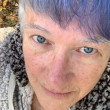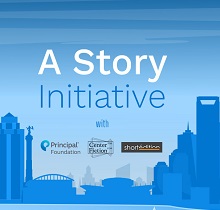The children don't understand.
The sweets they pine for are not squeezed from the machine with stripes intact. No—they must be painted on, by hand, with so much care. It is almost unimaginable, the
...
[+]
My adopted sister Ethel sat opposite me at the dinner table, waiting for the food to arrive in the multicolored bowls Mom had gotten long ago, to cheer Ethel up and encourage her to eat. Ethel was humming to herself, kicking her legs back and forth; I could tell because her body rocked rhythmically. She picked up her fork, examined it, and put it down. My father came in from the garage, cupped his hand over Ethel's head (she always looked up, grinning) and sat down.
Mom came in with a platter of meat and a bowl of mashed potatoes, slipping them onto the table, seating herself with satisfaction, flipping open her napkin, and bowing her head. "Grace," she said, her hands clasped together and prompting us with "Bless us O Lord." She heard two voices, not three, and looked over to Ethel, who was unfolding a five-dollar bill.
"Where'd you get that?" my mother asked.
"It was in my pocket," Ethel said. It was crinkled beyond her ability to smooth it out, but she kept flattening it with the palm of her hand.
"How did it get in your pocket?" my father asked quietly.
Ethel heard something in his tone and frowned with concern. "Is it my birthday?"
"No. It's not your birthday. How did it get in your pocket?"
She looked anxiously from face to face, all intent on her with serious looks. "I don't know," she said. "It was just there." Her mouth began to hang low and a little air of gloom settled on her shoulders. "I found it," she said. "I found it."
"Well," my mother said finally. "People lose money and people find money. You're a lucky little girl." She picked up the platter, moved off a slice of meat, then passed it to my father. "Eat up now." Dinner was quiet, with the five-dollar bill settled next to Ethel's plate like a napkin. She left it there after dinner as she went off to her coloring book before bed. I left it there as I cleared the table.
My mother had a friend with a summer place on a pond. We had heard of summer places, and they made me as uneasy as the extra fork at fancy dinners. I didn't think I would know how to behave, so I decided I would pretend to be Ethel's coach, and let Ethel make the mistakes I was sure I'd make.
And then we arrived and it was all nice—wooded, dappled, a little messy with all the dead leaves pushed off the path close to the house.
It was odd to see my parents with unfamiliar adults, adults who weren't family. Odd, and interesting. My mother's face lit up, and she forgot us. Oh—not literally. We were given lunch and soda and cookies and then we were on our own, my sister and I, like children in a fairy tale, off in the woods, relieved, really, ready to be off.
"Ethel," I said, "remember Hansel and Gretel? We should leave a trail of crumbs so we can find our way back. We can't always count on a fairy godmother showing up to help us."
She looked uncertain; she had half a cookie left, clutched in her hand. She liked to hang on to her food, nibbling at it like a caterpillar.
"We might never find our way back," I cajoled her. "We'd have to find a house made of candy cane."
"With a witch," she said solemnly.
"Those witches have sweet teeth," I agreed. "Another reason to get rid of your cookie."
Ethel nodded once, twice, looking down at the ground. "Okay, Eugenia," she finally said.
We walked again until a tiny pale-blue butterfly flickered in front of us. Ethel stepped off the path to follow it. I watched her for a few seconds. She looked up at me once, caught my eye, then spun around, and hopped quickly, her hands open, trying to catch it.
"Ethel, come back," I said sternly. I didn't want to go off the path into the bushes and trees. Ethel had forgotten about spiders and snakes; I hadn't.
And just like that she was out of sight. And just like that, fear hit my stomach; I imagined finding her body. And what shocked me—what came to me immediately—was how I would regret it because in my mind she was mine—mine to torment, to protect, to lord over; mine.
I raced into the bushes and trees. They opened up almost immediately, to a small clearing with a fallen tree trunk dividing off a section. A spill of sunlight made the spot cheery.
Ethel was sitting on the log, her back to me. I could see her head nodding and I heard her voice, though not the words. A moment ago I had been horrified by her loss; now I was a little disappointed at the lack of drama at finding her.
She seemed to be talking to someone, and I crept around the edge of the clearing, hoping to catch sight of a squirrel or rabbit as Ethel's companion. I got close enough to hear her finally.
"Fairy godmother," she was saying, "did you put that money in my pocket again?" She waited for an answer. "Well, Mom got a funny look on her face and I don't think she believes I didn't know where it came from. But I don't." She paused and listened. "Well, I want you to stop doing that. I got in trouble." Pause. I moved a little sideways; I wanted to see her face. "If you don't stop it, I'll tell Eugenia." I froze. "Well, you should be scared. Eugenia won't let anyone hurt me; she told me so. She said she loves me and she wants me to be her sister forever." My stomach was twitching by then; I had never said such things. Before she could say anything else, I rustled some leaves and broke a branch.
"Oh there you are," I called out cheerfully. "You almost had me worried."
Ethel stood up promptly. "Are we going back?" she asked.
"We're going back," I said. "And I want you to hold my hand so we don't get lost." She came up to me eagerly, her face all smiles. "It's not a good thing to be lost," I said. "Not a good thing at all."
I felt a little ashamed about the money. Any time an aunt or visitor brought a toy for Ethel, they slipped me a couple of quarters. I saved it all, changing the quarters into singles and the singles into fives. I snuck the singles into Ethel's pockets, or into her dirty sock so it would be discovered in the laundry. I had no ultimate plan; I could do it, so I did it.
I brought Ethel back. I led her to the kitchen and poured a glass of water, and then I went in search of my parents. The adults were lingering after coffee and I heard something in my mother's voice, some measure of tension, that made me silent and stealthy.
"It's really very worrisome," she was saying. "I keep finding money in her clothes, and I have no idea where she gets it. And I don't mean dimes and pennies. Dollars," she said unhappily. "Even a five or a ten sometimes. I've asked and she says she doesn't know where it came from."
Her friend Marge tsked. "Maybe she's not aware, poor thing. I mean, she probably has some issues. Though you're wonderful to take her in," Marge added hastily.
"Well, you know," her husband said, sipping his beer. "I understand adopted children have a higher incidence of criminality."
"Roger," his wife said, exasperated. "That's really not—"
"I didn't make it up," he said, raising his eyebrows. "I just mean psychologically, there's something that happens to them. Murder, too," he added. "Higher murder rates with adopted kids."
I stopped where I was, fuming. I hated these people. They were attacking Ethel, which was my prerogative, not theirs. And a rare, true measure of guilt hit me: they thought Ethel was a murderer because I hid money in her clothes.
My mother saw me, and the conversation veered off rapidly. I was quiet on the way home, and Ethel fell asleep, leaning against me.
I had snuck a dollar into her pocket, and she didn't wake up while I took it back.



